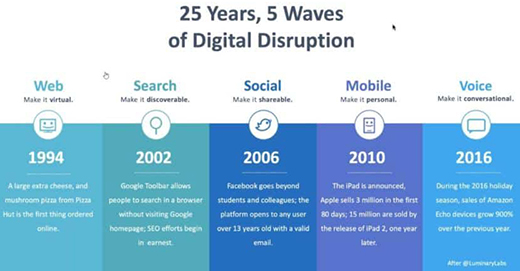Five years in the future: voice Interfaces will work as your “Other Brain”
This was originally published by PK, which is where this post concludes.

About a decade ago I was invited to keynote The Future of Digital Marketing conference in London. The organizers warned that my talk on how the era of mobile would drive change might get a skeptical reception. And that prediction didn’t fail: a few attendees described seeing smartphones as nothing more than toys that would never come anywhere near the computing power of desktops. My best retort was: “One device is mobile, can photograph, play music and knows its location…and you think the future is immobile, blind and unaware? You’d bet on immobility as the ideal?” We all laughed.
Today, we just call them phones, and they define the modern experience. Try going without your phone for a day, and it’s like stepping back in time: no maps to guide you, no way to text, delays on email responses, and forgotten phone numbers. In terms of necessity, losing one’s phone is in many ways a loss of identity, of our other brain.
As we approach the next decade, voice interfaces represent new ways we will interact with ambient computing. Due to our reliance on old-fashioned QWERTY keyboards, which were organized to slow typing down, we can talk four times faster than we type. That means voice search strings are longer and better able to trigger relevant results.
When our team visited with digital leaders at a conference this past fall, we focused in part on helping people to see Alexa and Siri as voice interfaces rather than toys. As Facebook’s Krishna Golden has said, “sometimes the best interface is none at all.” That’s where voice combined with the Internet of Things is taking us.
Next decade predictions
In 2019, there are about a billion and a half devices that serve as voice assistants, with as much of 65% of consumers ages 25-49 speaking to them daily. We’ve reached the tipping point. Some estimates have the use of voice assistants doubling every year for the next four years.
Just like how we would never go back to using flip phones, once there’s widespread adoption of voice interfaces, the idea of returning to tapping on minuscule screens will seem absurd. What’s wonderful about voice and voice assistants is that they don’t have screens. In many cases in life, having no interface at all is the ideal interface.

On the cusp of voice’s acceleration to dominance, I’ve put together five predictions for where voice will take us in the coming years.
Healthcare will lead in adopting voice applications
Healthcare providers are uniquely positioned to see early returns on voice. Innovators at the forefront of this technology are already improving patient outcomes. Libertana Healthcare Association, for example, used to have a red button in the room of every senior at their care centers. In the event one of their patients fell or needed assistance, the individual would have to push the red button to alert staff that something was wrong. Now, when a patient needs help, they call out to Alexa and explain their condition. The responding staff arrives prepared to deal with the situation. Nobody at Libertana would ever go back to living with a red button.
Voice will unlock access.
Airline pilots sit in cockpits surrounded by computers, and yet switches and dials are still manually manipulated. It’s only a matter of time before pilots begin to talk to their increasingly autonomous planes. This presents a challenge, in that access will have to be based on the pilot’s unique voice. As the human-machine-interface expands, the need for voice authorization technology becomes ever more pressing. From airplane cockpits to mobile banking, using one’s voice to gain access to secure data and devices will soon replace alphanumeric passwords.
Continue reading – see three more of my voice predictions on the PK website.

 The future of digital experiences will be built by strategists who grasp the full array of emerging business, social, and technical models. Specialties in user experience, branding, application design, and data science are laying the foundation for richer user experiences and business models breakthrough products and revenue based marketing.
The future of digital experiences will be built by strategists who grasp the full array of emerging business, social, and technical models. Specialties in user experience, branding, application design, and data science are laying the foundation for richer user experiences and business models breakthrough products and revenue based marketing.
5 Responses to "Five years in the future: voice Interfaces will work as your “Other Brain”"
June 21, 2020
Like it, interesting ideas. We will be seeing sci-fi inspired technologies in the future.
August 10, 2021
I have read lots of information before and I find this the most informative of them.
Motorized Trains
January 24, 2023
This is probably the best post on this subject.
https://www.melbourne-concreting.com.au/
May 11, 2023
That is bizarre to hear esvrm.com/
October 16, 2023
like free chatgpt technology at https://gptgratis.net/